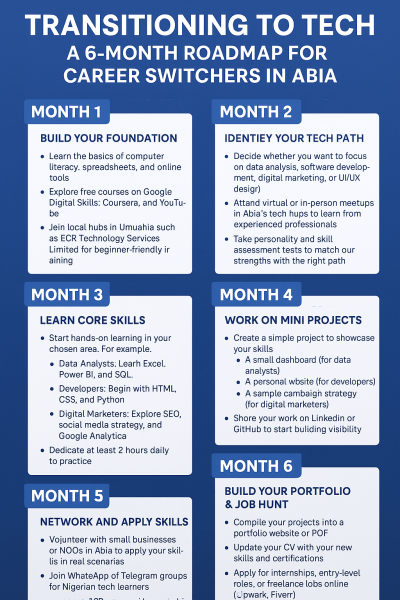Making a definitive career switch into the technology sector can feel overwhelming, especially when you are navigating the job market from a non-traditional tech hub like Abia State. The common misconception is that a Computer Science degree is mandatory. The truth is, the most in-demand skills in 2025 like Data Analysis, Product Design, and Cloud Computing are skill-based and can be mastered through structured, intensive training.
This comprehensive guide provides a clear, actionable, six-month roadmap designed specifically for career switchers in Abia, showing you how to move from zero tech knowledge to job-ready with practical skills, tools, and local support.
Month 1: Building a Robust Digital Foundation
Your first 30 days are dedicated to ensuring you are fully digitally literate—the non-negotiable prerequisite for any tech role.
Core Focus: System & Tool Fluency
- Master Computer Literacy: Go beyond basic navigation. Learn essential keyboard shortcuts (Windows and Mac), understand file management best practices, and become proficient in using cloud storage and collaboration tools.
- Spreadsheet Mastery (Foundation): Learn foundational spreadsheet skills in Microsoft Excel or Google Sheets. Focus on basic formulas (SUM, AVERAGE), data sorting, filtering, and conditional formatting. This skill is critical, regardless of your final tech path.
- Professional Presence: Create and optimize a professional LinkedIn profile. This is your global CV and networking hub. Start following industry leaders and connecting with local professionals.
- Local Resources: Begin your training with accessible, beginner-friendly resources. Join local initiatives or platforms like ECR Academy in Umuahia for introductory training that covers computer fundamentals and foundational data skills in a supportive, in-person or online environment.
Month 2: Strategic Tech Path Identification
Choosing the right tech niche based on your natural strengths and interests is vital for long-term satisfaction and career success.
Core Focus: Self-Assessment & Niche Selection
Tech Path | Primary Skillset | Why It Matters |
Data Analysis | Analytical, Systematic, Problem-Solving | High demand for interpreting business data and driving decisions. |
Software Development | Logical, Patient, Detail-Oriented | Building and maintaining the applications the world runs on. |
Digital Marketing | Creative, Communicative, Strategist | Driving revenue through online channels (crucial for local SMEs). |
UI/UX Design | Empathetic, Visual, User-Focused | Designing intuitive and enjoyable user experiences. |
- Test the Waters: Take short, free courses (Coursera, Udemy) in 3-4 different paths to get a real feel for the work involved.
- Consult Experts: Attend virtual or in-person meetups in Abia’s burgeoning tech community. Engage with professionals on platforms like LinkedIn to understand their daily tasks and required skills. Use these conversations to confirm your chosen direction.
- Commit: By the end of this month, commit to one specialization.
Month 3: Intensive Core Skill Acquisition
This is the most rigorous phase, dedicated to mastering the core, job-ready tools and concepts specific to your chosen field. Dedicate a minimum of 2–3 hours of focused practice daily.
Tech Path | Key Skills to Master | Learning Objective |
Data Analysis | Excel (Advanced), Power BI, SQL | Build dynamic dashboards, write complex queries (JOINs, GROUP BY), and understand data visualization principles. |
Software Development | HTML5, CSS3, JavaScript (Fundamentals), Git | Be able to build a fully styled, responsive webpage and manage code changes using Git/GitHub. |
Digital Marketing | SEO (On-Page/Off-Page), Content Strategy, Google Analytics | Learn to track website performance, conduct keyword research, and structure campaigns for local businesses. |
UI/UX Design | Figma, Prototyping, Design Thinking | Master the fundamentals of Figma for wireframing and prototyping; understand user research principles.
|
- Structured Training: Enroll in a structured program, like the specialized courses offered at ECR Academy, to ensure you cover essential topics systematically and receive guided instruction.
Month 4: Mini-Projects and Practical Application
Theory without application is useless. This month is about applying your core skills to solve simple, verifiable problems, which forms the foundation of your portfolio.
Core Focus: Application & Visibility
- Project Simplicity: Your projects should be small, self-contained, and perfectly executed.
- Data Analysts: Create a small sales dashboard for a fictional Nigerian retail store using Power BI, visualizing Month-over-Month Growth and Product Performance.
- Developers: Build a fully responsive personal landing page or a simple calculator application.
- Digital Marketers: Develop a sample content calendar and social media strategy for a local restaurant in Umuahia.
- Document Everything: Every project needs a clear README file or description explaining the problem, the tools used, and the insights gained.
- Share Your Work: Upload all code to GitHub and all dashboards/designs to LinkedIn or dedicated platforms (e.g., Tableau Public, Figma Community).
Month 5: Strategic Networking and Mentorship
The job you want will often come through who you know, not just what you know. This is where your local and online networks become invaluable.
Core Focus: Mentorship & Real-World Exposure
- Volunteer and Gain Experience: Volunteer your newly acquired skills for a small business, local NGO, or a church project in Abia. Applying your skills in a real environment provides critical experience and references.
- Seek Mentorship: Leverage ECR Academy's network for one-on-one mentorship. A mentor can review your projects, advise on interview preparation, and introduce you to relevant contacts.
- Professional Communication: Practice reaching out to recruiters and managers on LinkedIn with professional, customized messages. Ask for informational interviews, not jobs (yet).
- Community Engagement: Actively participate in Nigerian tech WhatsApp or Telegram groups. Offer help, ask insightful questions, and position yourself as a learner committed to the industry.
Recommended Articles:
Month 6: Portfolio Finalization and Job Hunting
You are now job-ready. The final month is dedicated to packaging your skills professionally and initiating the job search.
Core Focus: Packaging & Placement
- Portfolio Development: Compile your 3–5 best projects into a clean, easy-to-navigate online portfolio (a simple website or well-designed PDF). The portfolio should show the process behind your solution, not just the final product.
- CV Revamp: Your CV must now reflect your switch. Use keywords from job descriptions and emphasize transferable skills (e.g., project management, communication) alongside your new technical skills.
- Targeted Applications: Apply for internships, entry-level roles, and junior positions. Don't limit yourself to local jobs; many Nigerian tech companies hire remotely. Use platforms like LinkedIn Jobs, Jobberman, and specific tech recruitment sites.
- Interview Prep: Practice articulating your project work using the STAR method (Situation, Task, Action, Result). Be ready to discuss the challenges you faced and how you overcame them.
Conclusion and Recommendation
Switching to a tech career is a marathon, not a sprint. In just six months, you can move from being an absolute beginner to a candidate with practical, market-ready skills and a professional network. Your success depends on the consistency of your effort and the quality of your training.
Are you ready to stop wishing and start doing?
Ready to Launch Your Tech Career?
Whether you're starting or upgrading your tech skills, you can begin your learning journey with us today.
Review Affordable Tech Course with us at ECR Academy We provide the hands-on, project-focused training you need to master tech skills like Digital Marketing, Web development, Data Analysis, Cybersecurity.
Build Comprehensive Digital Solutions with ECR Technology Services Limited Let us help you bring your brand, business, or idea online with professional digital solutions such as secure, responsive websites, robust mobile applications, high-impact digital marketing templates, and specialized Learning Management Systems (LMS).
Contact Us Today:
Frequently Asked Questions
Do I need prior tech knowledge to get started?
No. Most successful career switchers in Abia started with little to no background in tech.
Can I balance tech training with a full-time job?
Yes. With 1–2 hours of daily practice, you can progress steadily while working.
Q3: How much does it cost to learn tech in Abia?
It varies. Free resources exist online, while structured programs like those at ECR Academy offer affordable training packages.
Q4: Which tech skill is best for beginners in Abia?
Data analysis and digital marketing are great starting points due to high demand and accessibility.
Q5: How can I connect with tech professionals in Abia?
Attend local events, join LinkedIn groups, and engage with hubs like ECR Technology Services Limited in Umuahia.

 Data Analysis
Data Analysis
 0 comment
0 comment
 29 Sep, 2025
29 Sep, 2025

SOPHIA OLISE
Data Analyst
Olise Sophia Amarachi is a passionate and purpose-driven data analyst and digital skills advocate based in Nigeria. With a strong foundation in Excel, Power BI, and SQL, she empowers others—especially young people and corps members—through practical training, tech mentorship, and values-based leadership. Sophia’s journey into data analysis began during her NYSC year in Abia State, where she committed herself to learning and growing from scratch. Today, she shares her knowledge through online classes, challenges, and hands-on projects, including dashboards and reports that translate complex data into clear insights.
0 comment